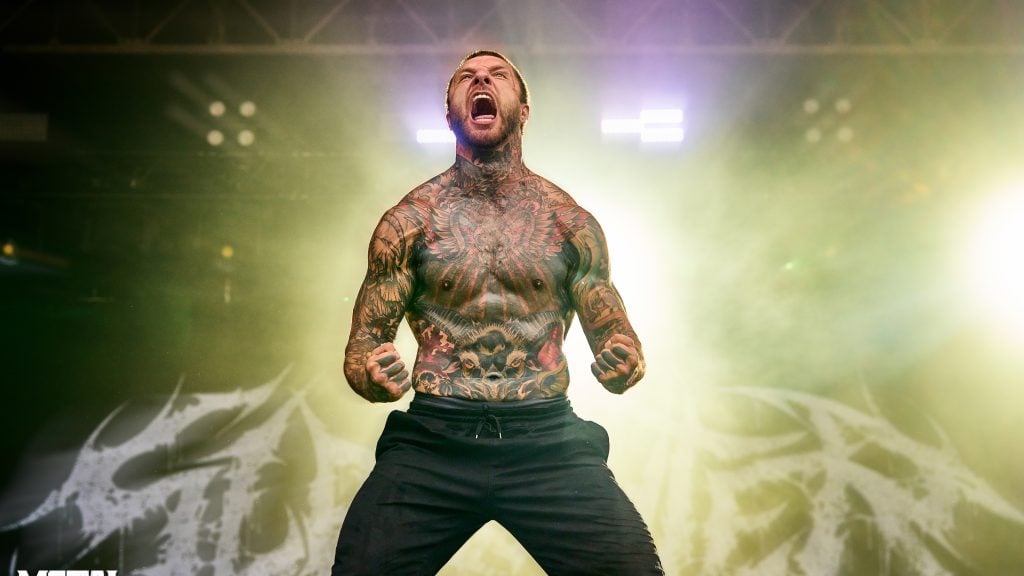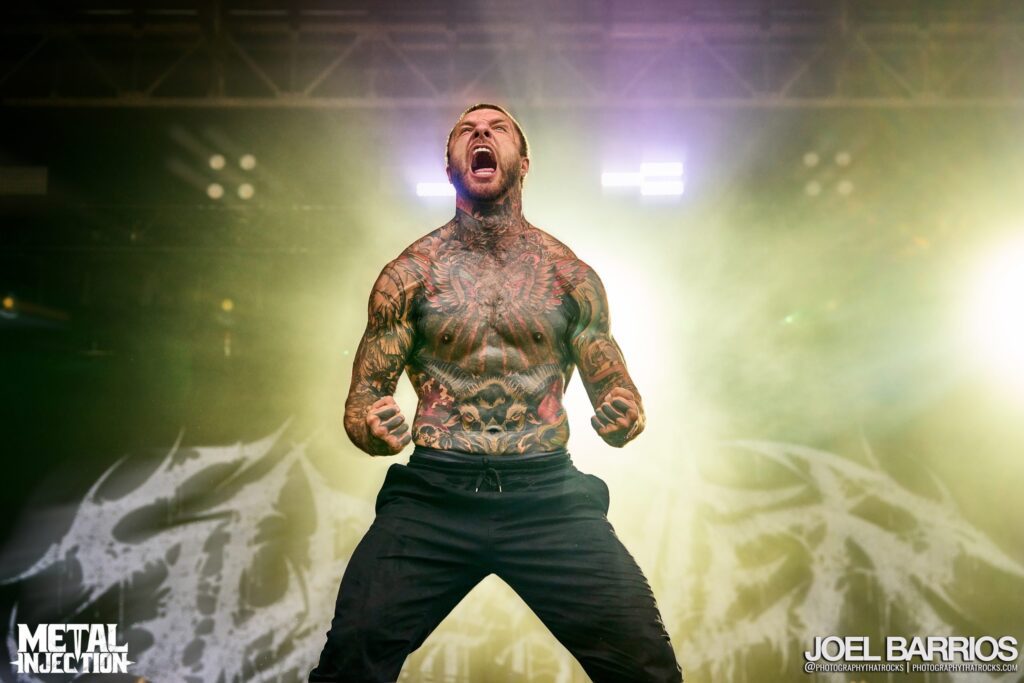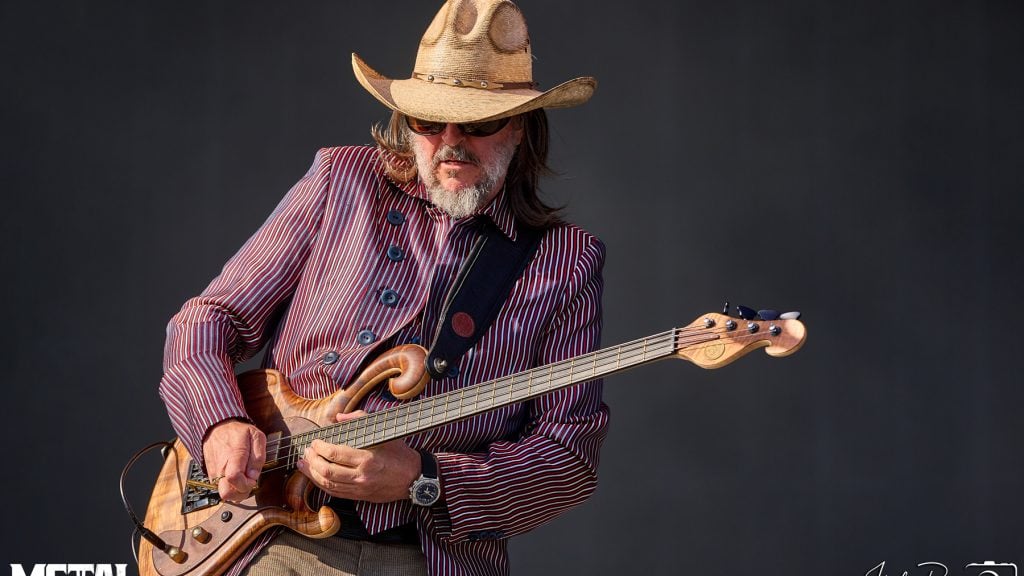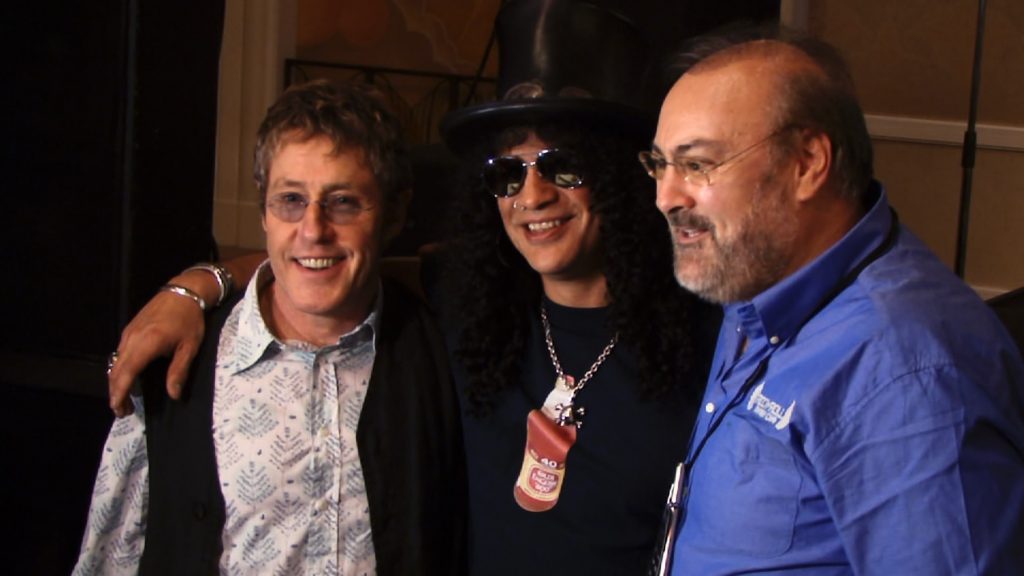
SLAUGHTER TO PREVAIL’s ALEX TERRIBLE Reveals The One Thing That Terrifies Him, Offers Brutal Advice To The New Generation

At this point, Slaughter To Prevail has built a reputation as one of the most unrelenting live acts in modern metal. Their frontman, Alex Terrible, sits at the center of that storm – a figure who commands Walls of Death like ritual offerings and who speaks with the kind of unvarnished candor few artists dare. Yet beneath the intimidation lies something more complicated: a man wrestling with his role as an artist, collaborator, and soon, a father.
The band’s latest album, Grizzly, arrived in the summer, and Alex is clearly satisfied with the reception. “People love it,” he told us shortly before the band’s set at Louder Than Life, adding that the festival crowds have gone “crazy no matter what.” That chaos, however, comes with a cost.
The infamous Wall of Death has become almost synonymous with their shows, a demand from fans that Alex sometimes questions. “People love that. People ask me to do that every single festival and every single show, so we have to do that, you know, we have no options. But actually, when I spoke with the guys who got to experience the Wall of Death at Inkarceration Festival last July, they said they felt terrified because it was so packed. And when they just slammed into each other, and there was no space at all. And they just felt that pressure, and they couldn’t even stand. I was like, ‘This sounds bad’. Maybe I don’t want to do that anymore. But the fans keep demanding it. ‘No, you have to do that.’”
The conversation naturally shifted to the creative process behind Grizzly and how singles were released. Unlike bands that carefully map out records, Slaughter To Prevail took a looser path with their latest album. Singles like “1984” came out as soon as they were written, dictated by impatience and a hunger to share. “If we write the song, we want to drop it like right now,” Alex explained. The band’s management pushed back, insisting on a more calculated release schedule, but Alex shrugs at the process. “Our manager and label said, No, you have to wait… So we just wrote the rest of the album, like five or six songs, you know. And it is what it is.”
His approach to lyrics has been equally instinctive, often secondary to the music. “First of all, we write the music and then the lyrics, yeah. But maybe for the new album, I will write something serious. Because I never took the process of writing lyrics too seriously. I just enjoy it, then write stupid sh*t. And my English is very poor, you know. But for the next album… I will focus more on lyrics. Make it more like a dude. And like, how do you call it, kind of reflecting?”
Grizzly also saw the band stepping into unexpected collaborative territory. One of the standout moments was a track with Babymetal, something that might have seemed unlikely but came together almost casually. “We met one of the guys who works with Babymetal at Resurrection Festival in Spain… He just very quickly was like, ‘Hey, how about we collab?’” Alex recalled. “So we just wrote it together on the road, sent it to him, back and forth. Done. It was easy. Yeah, it was simple. Very good. They’re very efficient.”
When we asked about dream collaborations, Alex didn’t hesitate: “Till Lindemann. Of course. I would collaborate with Lindemann.”
He added a second, even more ambitious wish: “I would say Slipknot. I know it’s maybe impossible. Maybe it’s possible. I don’t know. I’m living in the matrix sometimes, you know… What if we did an actual collab with Slipknot, like with Babymetal, so even merging the visuals or something like that would be great. Instead of just a Corey Taylor collab or whoever, I think just the actual bands. You guys are like 17 people on stage. That’s what we want.”
Moving to the United States meant Alex had to grapple with a cultural shift. He sees American audiences as spoiled compared to the hunger he remembers from Russia and other regions less frequented by touring acts.
“You guys have this big culture from the 70s, I believe, or maybe from the 60s… Back in the USSR, it was like, Satanic music, you cannot play it… And in the 90s, we started to listen to this more and more and more. But you guys already had big platforms, and rock and roll, it’s like second nature… And the difference is that people in America are so spoiled. They’re so overdosed with all of this music in general. In Europe, in Russia especially, people are hungry for good bands. Because good bands don’t travel that much to Europe, Asia, and all these parts of the world. So, people back there are hungrier about seeing bands play live. And that’s quite the contrast with what I see here, in America.”
For someone who looks invincible on stage, Alex revealed one vulnerability: spiders. “I’m not allergic. I’m just afraid of spiders,” he admitted. But when it comes to bears, the story shifts into something almost mythic. Alex has carried a fascination with them since early childhood, one that his mother still teases him about.
“I remember when I was three years old,” he recalled, “And my mom told me that I would be riding my three-wheeled bicycle in the kitchen, always telling her stories that I was hunting in the woods, found a bear, and killed the bear.” He laughed, but insisted, “I’m not lying, this is exactly what she said I would repeat, literally every single day.”
It’s as if bears have haunted his imagination since before he could even understand why. “Maybe in the back of my mind, or in my previous life, I got killed by a bear. I don’t know.”
The conversation took a heavier turn when he was asked what he would tell his 15-year-old self—or any kid struggling to find their place. Alex didn’t sugarcoat it: “Stop being f*cking snowflakes. Stop searching for your weaknesses and make it your priority,” he said, his tone cutting through like one of his guttural screams.
To him, weakness isn’t something to lean on; it’s something to crush. “You have to find your f*cking weaknesses. This is what metal is about. You have to fight and be a better version of yourself. Be stronger and make this example for your kids so they will be stronger than you and build a f*cking good society you can live in.”
It’s a philosophy rooted in hardship, in memories of his parents working endlessly to provide, and one that has shaped how he sees modern comfort. “Right now, we have everything, literally. We do nothing, just chilling on the sofa. It’s actually bad for the next generation, because that’s the mentality they are seeing.”
Despite his extreme persona, Alex is most vulnerable when talking about fatherhood. His partner is expecting, and while he seems unshaken by anything else in life, this is different. “Everything, literally,” he admitted when asked if anything scared him. “Because I want to be a good dad, but I don’t think I will be a good dad.”
The conversation ended on a lighter note: what album would he listen to if he found himself stranded by his tour bus? His answer came quickly: “I would pick any album by Tool.” An interesting choice for someone who thrives on intensity and unrelenting music. Tool’s sprawling, meditative songs stretch on for ten, sometimes fifteen minutes, the kind of music that doesn’t just fill time but bends it. For Alex, it would likely be more than background noise, serving as some sort of survival fuel.
Special thanks to Marie-Christine Matthews for her help with this interview.
[embedded content]




